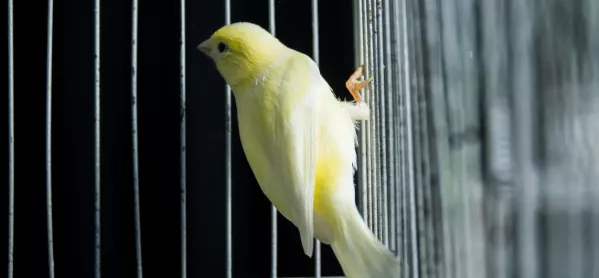- Home
- Private schools are a canary in the pensions mineshaft
Private schools are a canary in the pensions mineshaft

A small earthquake just happened in North Oxford. No cups rattled, no birds fell from their branches, but its shockwaves will travel far and wide across all independent schools.
The two-day strike by the staff of St Edward’s, protesting about the school’s decision to withdraw from the Teachers’ Pension Scheme (TPS), could be of huge significance, and it is unlikely to be contained within the sector. It will ripple into every staffroom in every school in the country, primary or prep, comprehensive or selective.
My sector is a test case, a canary in the mineshaft of staff benefits, and there will be politicians and special advisers, actuaries and policy wonks, watching how many people rush to save that brightly plumed but privileged bird, before turning their attention to the maintained sector.
Need to know: Who will pay for teachers’ pensions?
Quick read: Private schools could have ‘phased withdrawal’ from teacher pensions
Politics: Minister suggests state-school teachers are ungrateful for their pensions
Wacky Races, directed by Ken Loach
In case you missed it, from September, independent schools have to accommodate the government’s decision to increase employer contributions to the TPS from 16.48 per cent to 23.6 per cent, a hike of more than 43 per cent.
This huge increase has not attracted a great deal of coverage in the mainstream press, because the government has said that they will fund state schools - for now. The teachers in St Edward’s voted to take industrial action. Placards were painted, slogans worked on, perhaps first in pairs, then in groups. Meanwhile, law firms begin to circle.
In Brexit Britain, sudden shifts from the real to the surreal are the new norm. We seem to have dual vision running simultaneously before our eyes, one lens filtering black-and-white scenes of apocalyptic bleakness, the other pushing cartoon-like saviours into our brains, trying to trick us with easy panaceas. It’s like living in a Wacky Races episode directed by Ken Loach. We’re laughing and crying at the same time, like some lonely hysteric lost in a Bird Box existence, trying to avert our attention from the news cycle before the darkness sucks us in.
Glaring, political juxtapositions come and go with breezy insouciance (Jeremy Corbyn in charge of Labour, Boris Johnson in charge of the country, Nigel Farage in control of our collective consciousness). Another one - a picket line outside an independent school - just passes by unnoticed. “Solidarity from Lambeth,” tweets an NEU executive member: it’s as if Wolfie Smith is radicalisng Hyacinth Bucket, except that nobody is laughing, no one sees the irony of it all. Everybody wants to look away.
Epic ineptitude
How did it come to this? Well, obviously, it requires an epic ineptitude of forward-planning that is almost genius-like to behold: to turn independent school staff into Gramscian radicals is an achievement that even Seumas Milne would doff his beret to. Education secretary Damian Hinds could go down in history as the man so lacking in leadership, and so unaware of intended consequences, that he has done just that. Chaos seems to reign in Whitehall, so much so that even the schools minister, Lord Agnew, has called these changes “appalling”.
But nobody does anything. Nobody cares. Everyone wears bandages over their eyes. No doubt the offices of Momentum are stocking up on something drinkable that does not have overt connotations with Tony B****, to toast the man who was responsible for closing down more independent schools than Anthony Crosland could have dreamed of in his most intoxicated moments of delusion.
With these changes to the TPS, independent schools are facing one of the biggest challenges of recent years. Schools such as St Edward’s find themselves in an unenviable position, trying to justify their fees to parents but also keep their books balanced.
Who picks up the pieces?
Big, affluent schools will survive. Smaller schools, and particularly some prep schools, will find it too much, the margins too thin, and will sink into liquidation. Who picks up the pieces then? Who supports the staff, children and families when this happens? Who cares about the jobs in the local community that will be at risk? Will extra funding be available to local state schools when all this happens? Well, what do you think?
It is a false economy to think that this adds up. Many have wished for independent schools to be closed down. Can the maintained sector cope with a sudden influx of new arrivals, with new pressures to add to what they are already struggling to cope with? We may be about to find out.
David James is deputy head (academic) of Bryanston School
Keep reading for just £1 per month
You've reached your limit of free articles this month. Subscribe for £1 per month for three months and get:
- Unlimited access to all Tes magazine content
- Exclusive subscriber-only stories
- Award-winning email newsletters



